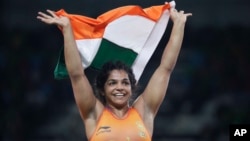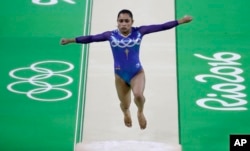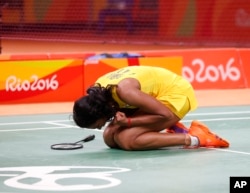India celebrated on Friday 21-year old Pusarla V. Sindhu, who became the first Indian woman to win a silver medal in the Olympics Game when she took second in singles badminton in Rio on Friday.
A woman also won the country's only other Olympics medal so far in the Games: Sakshi Malik, 23, won bronze in the 58 kg women's freestyle wrestling competition.
Prime Minister Narendra Modi congratulated the two women medal winners.
But even as banner headlines, news anchors and Indians across the country exulted over the women's success, the country agonized over the question that haunts it at every Olympics — why does a nation of more than a billion people perform so dismally on the world’s premier sporting stage?
India's performance at Rio has born so poor that even those who missed out have received applause: earlier this week there was high praise on Twitter for the country’s first female gymnast, Dipa Karmakar, after she finished fourth.
There is reason for the accolades heaped on them: these success stories are crafted around individuals driven to succeed largely on their own steam.
India fielded its largest contingent of 119 athletes at the Rio Games, hoping to improve its haul of six medals at the London Games in 2012.
Training
Most of the athletes have fallen short, and the reasons are apparent — although there is no dearth of talent in the country, early identification of talent and proper training and support remain huge hurdles. Since India first participated in the world’s premier sporting event in 1900, its haul of medals — just 26 — is much less than many smaller countries.
“There is no attempt to improve the grassroots, or the environment, or the ecology around sports and you cannot have a superstructure without a foundation. Until that happens you will continue to get results like this,” said Maneesh Bahuguna, of Anglian Medal Hunt, a young company that hopes to nurture sporting talent by focusing on athletes mostly from financially disadvantaged backgrounds.
Sports commentators also point to an inefficient sports administration. Over the past decade, large sums of money have been raised to improve infrastructure, but most stadiums remain underutilized.
“Sometimes in this bureaucratic jungle a lot of things get submerged. Since it has become government property, you are not allowed to use those facilities,” frets sports columnist Veturi Srivatsa.
But despite the problems, there are some signs that a sporting culture is emerging in a country where education has always taken precedence, with most parents pushing their children to become engineers, doctors and technocrats rather than sportsmen.
Successes
Pointing to the success of Malik in wrestling and gymnast Karmakar, columnist Srivatsa said change is happening although it needs to gather pace. “They are the people who have come from rural areas, the backwaters of Indian sport. They are the people to be taken note of,” he said.
In a small way, the private sector has also begun to play a role, with private academies to train players and companies like Anglian Medal Hunt extending support to about 40 athletes.
“We have 13-year-olds, 14-year-olds, we are trying to focus on them and see where we can go with them," Srivatsa said. "Whatever world champions are practicing, we try to bring those practices to them."
Still, many point out that as soon as the Olympics are over, the country is likely to return to its obsession with the sport that dominates the national imagination, cricket.
Commentators pointed out it was ironic that on the day India won its first medal at the Rio Olympics after much hand-wringing over its dry run, its cricket team grabbed the world number one ranking, underlining that it could achieve success when it wants.






